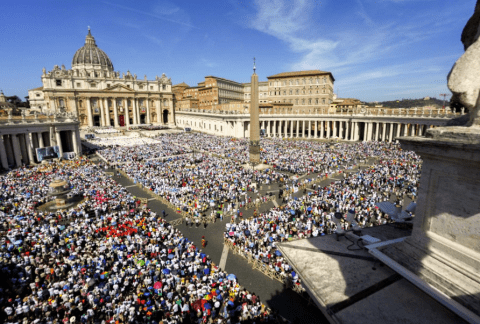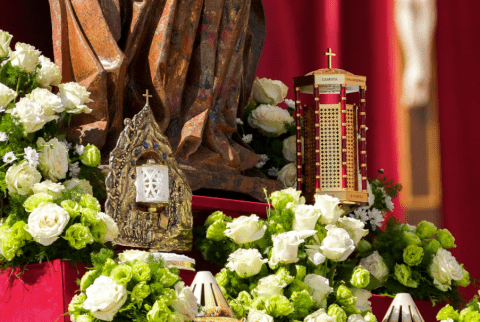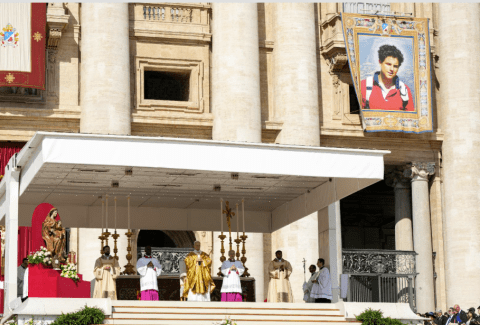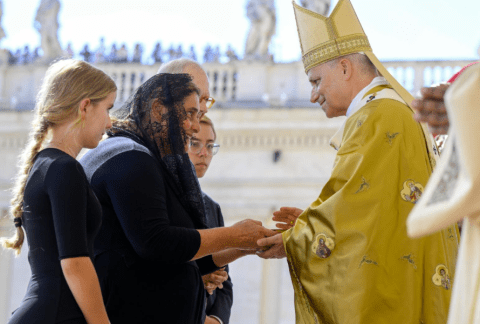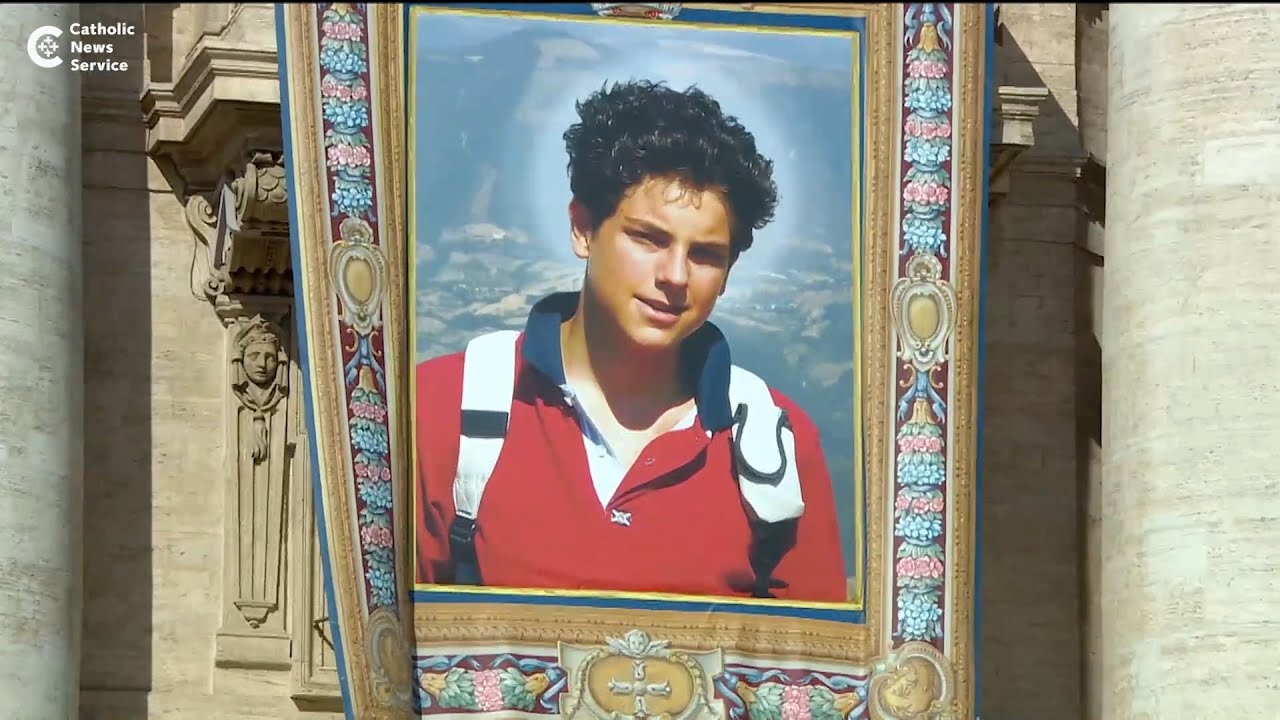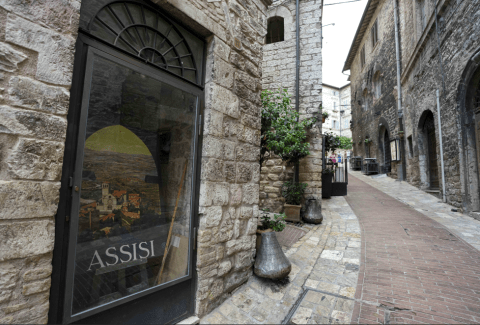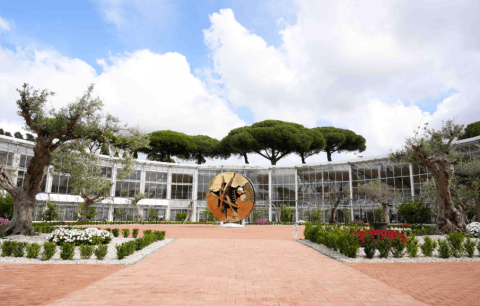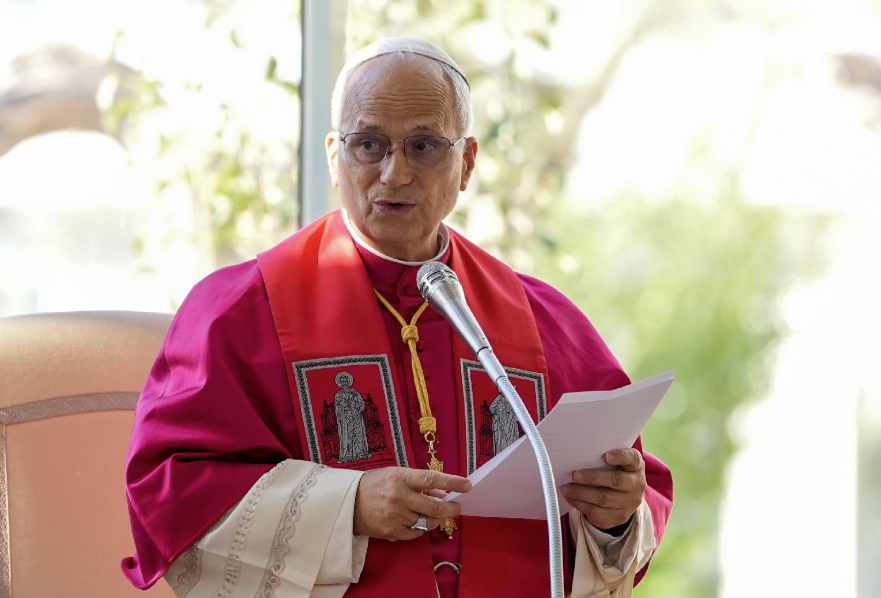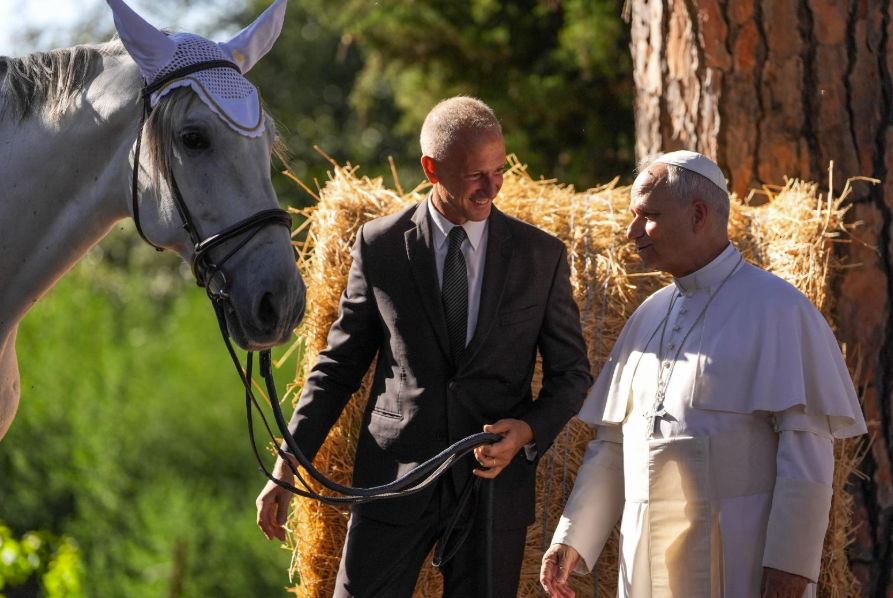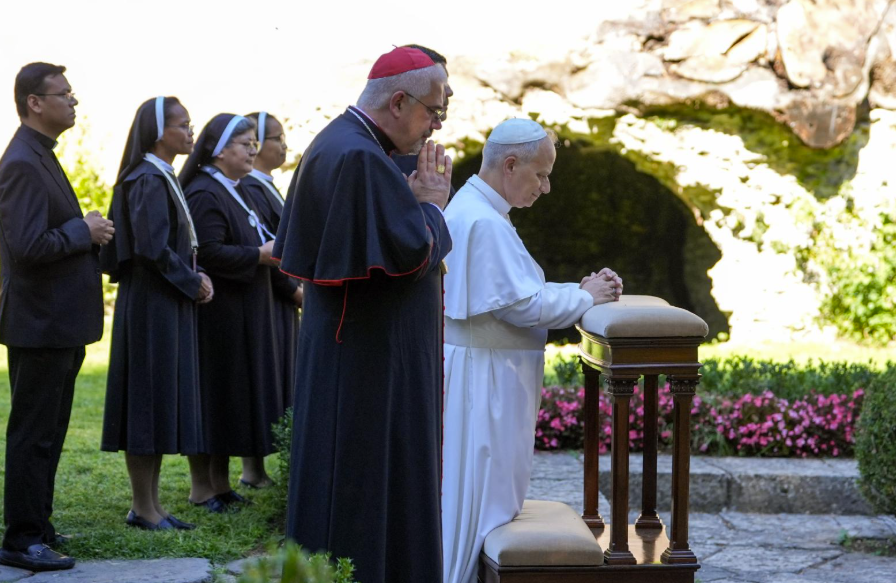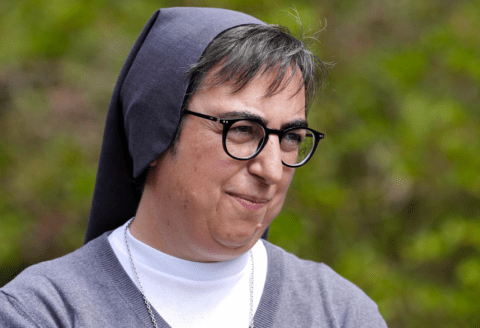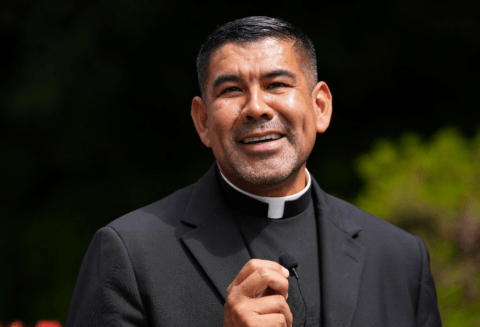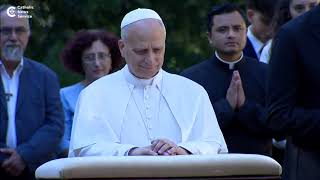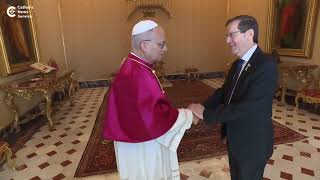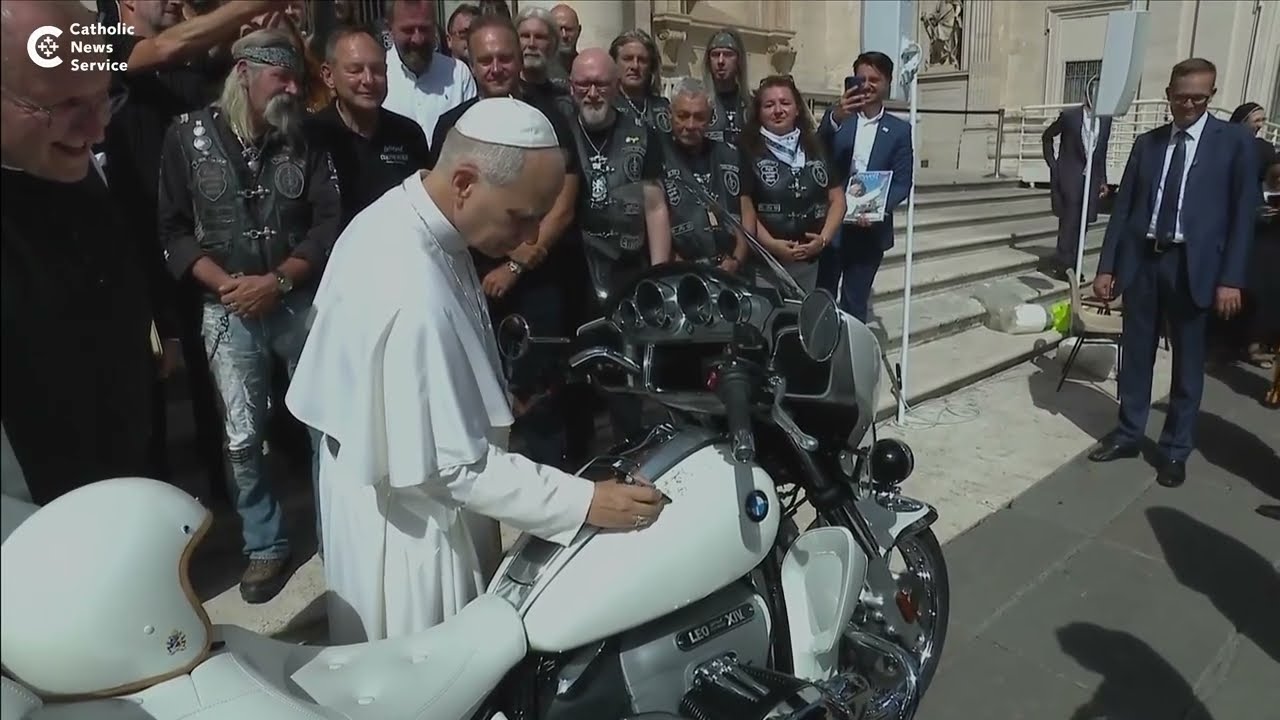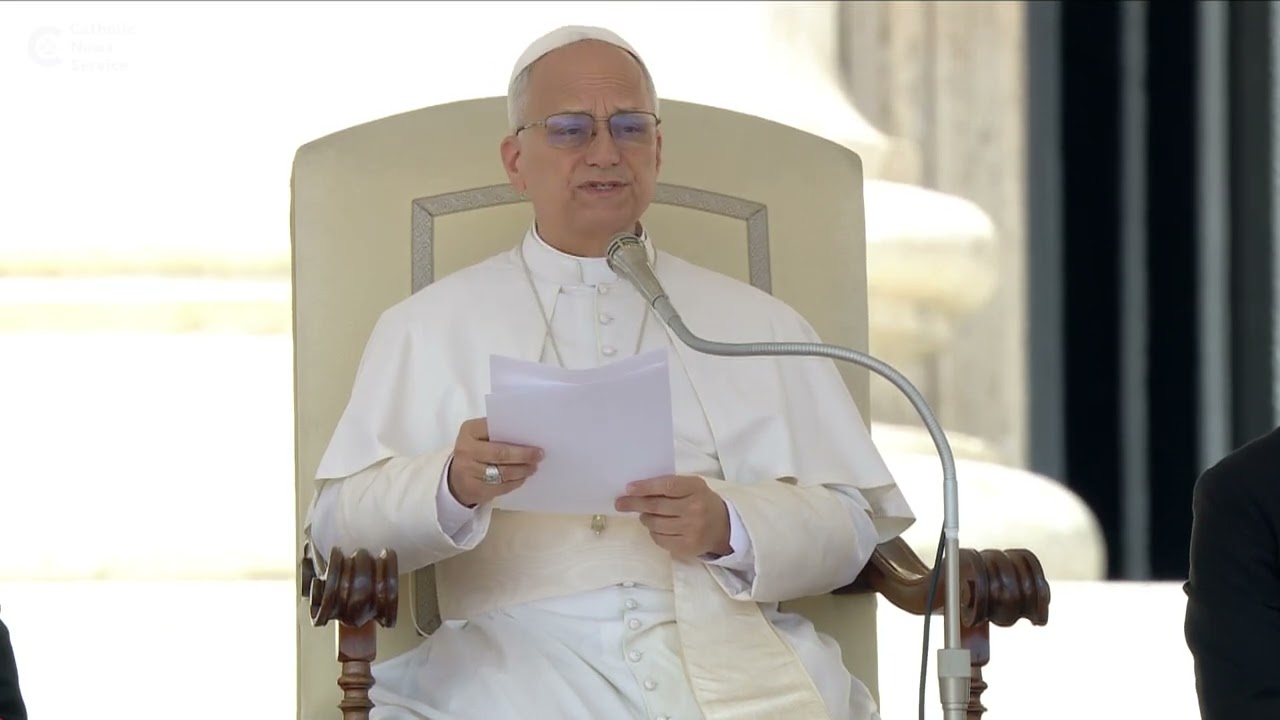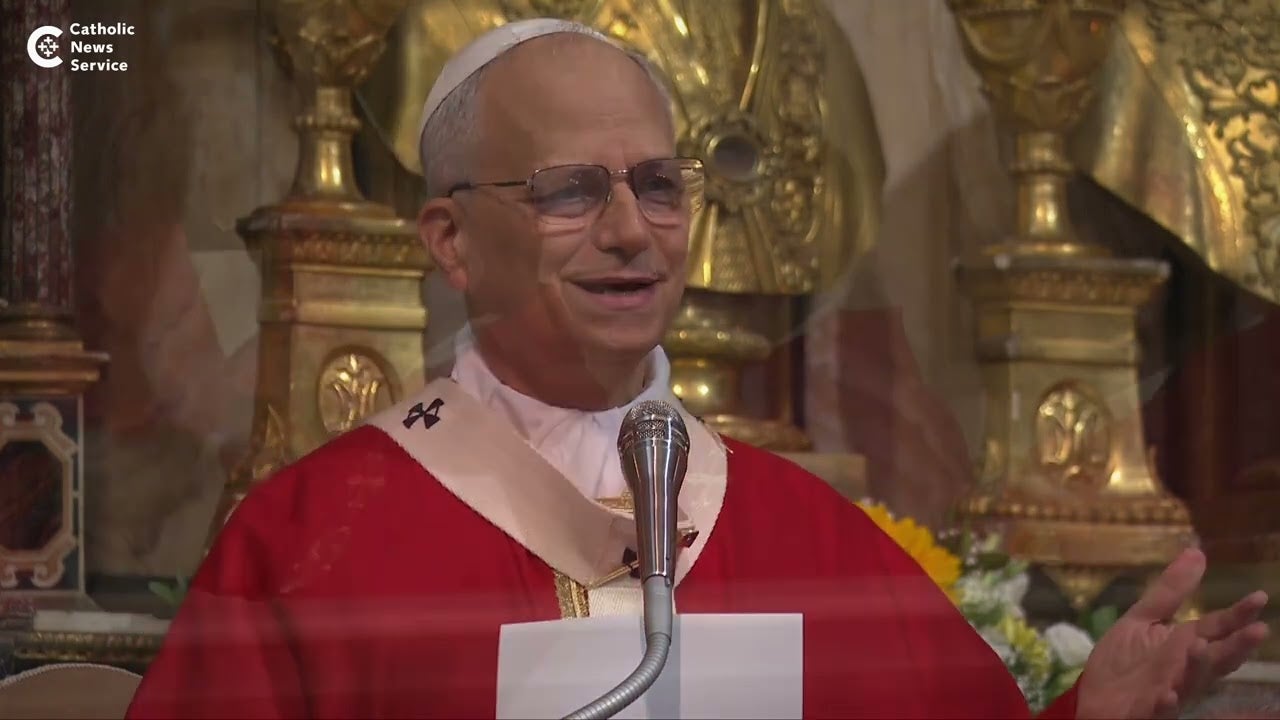Browsing News Entries
Pope: Church needs to promote greater study, understanding of Mary
Posted on 09/9/2025 08:30 AM (USCCB News Releases)
VATICAN CITY (CNS) -- The Catholic Church needs the theological study and model of Mary, Pope Leo XIV said, calling for a great promotion of Mariology in parishes, religious life and educational centers.
Mary, the mother of Jesus, "never ceases to open doors, build bridges, break down walls and help humanity to live in peace and in the harmony of diversity," he said Sept. 6 during an audience with some 600 scholars attending a conference on Mariology.
The Pontifical International Marian Academy organized the 26th International Mariological Marian Congress in Rome Sept. 3-6, discussing the theme, "Jubilee and Synodality: A Church with a Marian Face and Practice." Participants included Orthodox, Protestant and Muslim scholars.
In his address, Pope Leo underlined the pontifical academy's importance as being "a forum for thought, spirituality and dialogue, tasked with coordinating the studies and scholars of Mariology, in the service of a genuine and fruitful" Marian piety.
"The Virgin Mary, mother of the church, teaches us to be the holy people of God," he said.
"Mary is always ready to respond by first listening to the Word," he said.
He highlighted St. Augustine's warning against praying to Mary to hear what one wants by quoting the saint: "All consult you about what they want, but they do not always hear the answer they want. Your most faithful servant is the one who does not seek to hear from you what he wants, but rather to want what he hears from you."
Mary is a "synodal" woman, he said, because she is "fully and maternally engaged in the action of the Holy Spirit, who summons those who previously believed they had reasons to remain divided due to mutual distrust and even enmity as brothers and sisters."
"A church with a Marian heart always better preserves and understands the hierarchy of truths of faith, integrating mind and heart, body and soul, universal and local, person and community, humanity and cosmos," Pope Leo said.
"It is a church that does not shy away from asking herself, others and God uncomfortable questions -- 'How shall this be?' -- and to walk the demanding paths of faith and love," he said.
"A Marian piety and practice oriented toward the service of hope and consolation frees us from fatalism, superficiality and fundamentalism; it takes all human realities seriously, starting with the least and the discarded; it contributes to giving voice and dignity to those who are sacrificed on the altars of ancient and new idols," he said.
"Since the vocation of the mother of the Lord is understood as the vocation of the church," he said, "Marian theology has the task of cultivating in all the people of God, first of all, a willingness to 'start afresh' with God, his Word and the needs of our neighbor, with humility and courage."
"It must also cultivate the desire to walk toward the unity that flows from the Trinity, in order to bear witness to the world, to the beauty of faith, the fruitfulness of love and the prophecy of hope that does not disappoint," he added.
"Contemplating the mystery of God and history of Mary's inner gaze protects us from the distortions of propaganda, ideology and unhealthy information, which can never speak a disarmed and disarming word, and opens us to divine gratuitousness, which alone makes it possible for people, populations and cultures to walk together in peace," the pope said.
"This is why the church needs Mariology," he said. "It should be considered and promoted in academic centers, shrines and parish communities, associations and movements, institutes of consecrated life, as well as in places where contemporary cultures are forged, valuing the limitless inspiration offered by art, music and literature."
Pope Leo XIV Accepts Resignation of Auxiliary Bishop Michael Boulette
Posted on 09/9/2025 08:30 AM (USCCB News Releases)
WASHINGTON - Pope Leo XIV has accepted the resignation of the Most Reverend Michael J. Boulette, 75, from the Office of Auxiliary Bishop of San Antonio.
The resignation was publicized in Washington, D.C. on September 9, 2025, by Cardinal Christophe Pierre, apostolic nuncio to the United States.
The Archdiocese of San Antonio is comprised of 23,180 square miles in the State of Texas and has a total population of 2,925,226, of which 1,148,253, are Catholic.
###
Jubilee event to honor modern martyrs as symbols of hope
Posted on 09/8/2025 08:30 AM (USCCB News Releases)
VATICAN CITY (CNS) -- In a Jubilee year dedicated to hope, Pope Leo XIV and Christian leaders will commemorate "new martyrs and witnesses of the faith" -- people whose lives were signs of hope to the people around them and who died firm in the hope of being welcomed into God's presence, said the secretary of the Vatican Dicastery for the Causes of Saints.
Archbishop Fabio Fabene, dicastery secretary, told reporters Sept. 8, "Pope Leo hopes the blood of these martyrs will be seeds of peace, reconciliation, fraternity and love."
Like St. John Paul II did during the Holy Year 2000, Pope Leo will preside over an ecumenical prayer service for the Jubilee 2025 commemorating Catholics, Orthodox, Anglicans and Protestants who died for their faith between 2000 and 2025.
Pope Francis had established a commission in 2023 to compile "a catalogue of all those whose blood was shed to confess Christ and witness to his Gospel" in the 25 years since the last Holy Year.
Those martyrs -- Catholic, Orthodox, Anglican and Protestant -- will be remembered Sept. 14, the feast of the Exaltation of the Cross, during a prayer service at Rome's Basilica of St. Paul Outside the Walls, a frequent site for ecumenical prayer.
At a news conference Sept. 8, Andrea Riccardi, a historian and vice president of the commission, said the catalogue includes 1,624 Christians whose names were submitted by bishops' conferences, religious orders and nunciatures from all over the world.
Riccardi, who also is founder of the lay Community of Sant'Egidio, also gave a continental break down of those slain: 643 people in Africa; 357 in Asia and Oceania; 304 in North and South America; 277 in the Middle East and North Africa; and 43 in Europe, although 110 of the total killed on other continents were missionaries from Europe.
Archbishop Fabene said the Vatican still was studying how, when and if to publish the names in the catalogue, taking into consideration the possibility that doing so could endanger other Christians living and ministering in the same geographical areas.
"They set the anchor of their hope in God, not in the world," the archbishop said; "they hoped in the Lord and their reward will be eternal life."
In addition, said Msgr. Marco Gnavi, secretary of the commission, "The hope that was the motif of their lives before their deaths brought hope" in contexts where their brothers and sisters often were the victims of ethnic conflict, religious persecution, organized crime or the deadly denial of their rights.
For example, the commission members said, the list includes Sister Dorothy Stang, a U.S. member of the Sisters of Notre Dame de Namur, who was shot and killed in the Brazilian Amazon in 2005 for defending the land rights of the Indigenous and poor farmers.
Father Angelo Romano, a member of the commission and official at the Dicastery for the Causes of Saints, told Catholic News Service the catalogue is not part of the official Catholic process for recognizing the martyrdom of a potential saint, however, some of the people included already have a sainthood cause underway, and other causes could begin in the future.
The ecumenical commemoration St. John Paul presided over in 2000 was held at Rome's Colosseum, a symbol of Christian persecution and martyrdom. Father Romano said the Vatican "would have loved" to do the 2025 prayer service there, but the city of Rome has new archaeological digs just outside the Colosseum, which severely limits the space available for participants.
Knowing that, as Pope Francis often said, the number of Christians martyred today is more than in the first centuries of Christianity should not lead Catholics to feel under attack but should motivate solidarity, Father Romano said.
"A society that may even be aggressive toward the Christian faith is one thing; being persecuted is another," he said. "Persecution means that going to Mass is a risk, that praying is a risk, that being a Christian is a risk, that practicing charity in the name of faith is a serious risk."
"Another mistake that I think we must avoid when talking about martyrdom -- a mistake in the strictly theological sense -- is trying to understand martyrdom only in quantitative terms: how many there are," the priest said.
The numbers help people understand the scale of the phenomenon, he said, "but theologically we must be careful not to focus too much on quantity, because even one martyr is immense, enormous -- a reason for reflection for the whole church."
"In a world where there is so much to worry about, including increased violence at all levels, the martyr witnesses to nonviolent hope," Father Romano said. "A martyr chooses not to respond to evil with evil, not to respond to hatred with hatred, but with love."
Several of the groups of new martyrs mentioned at the news conference were Christians killed in church during terrorist attacks.
Archbishop Fabene was asked if Fletcher Merkel, 8, and Harper Moyski, 10, who were shot and killed during a school Mass at Annunciation Catholic Church in Minneapolis Aug. 27 could be considered martyrs.
"If a diocese or other local ecclesial realties present these figures to us as witnesses of the faith, we will examine them and will see if they can be included in the list," he said.
New young saints encourage faithful to live life to the full, pope says
Posted on 09/7/2025 08:30 AM (USCCB News Releases)
VATICAN CITY (CNS) -- The greatest risk in life is to waste it by not seeking to follow God's plan, Pope Leo XIV said, proclaiming two new saints -- two young laymen of the 20th and 21st centuries.
"Sts. Pier Giorgio Frassati and Carlo Acutis are an invitation to all of us, especially young people, not to squander our lives, but to direct them upward and make them masterpieces," the pope said Sept. 7.
"The simple but winning formula of their holiness," he said, is accessible to everyone at any time. "They encourage us with their words: 'Not I, but God,' as Carlo used to say. And Pier Giorgio: 'If you have God at the center of all your actions, then you will reach the end.'"
Before canonizing the first saints of his pontificate, Pope Leo greeted the more than 80,000 faithful who had gathered early in St. Peter's Square because he wanted to share his joy with them before the start of the solemn ceremony.
"Brothers and sisters, today is a wonderful celebration for all of Italy, for the whole church, for the whole world," he said before the Mass.
"While the celebration is very solemn, it is also a day of great joy, and I wanted to greet especially the many young people who have come for this holy Mass," he said, also greeting the families of the soon-to-be saints and the associations and communities to which the young men had belonged.
Pope Leo asked that everyone "feel in our hearts the same thing that Pier Giorgio and Carlo experienced: this love for Jesus Christ, especially in the Eucharist, but also in the poor, in our brothers and sisters."
"All of you, all of us, are also called to be saints," he said, before leaving to prepare for Mass and paying homage to a statue of Mary with baby Jesus and the reliquaries containing the relics of the two young men.
In his homily, the pope underlined Jesus' call in the day's Gospel reading "to abandon ourselves without hesitation to the adventure that he offers us, with the intelligence and strength that comes from his Spirit, that we can receive to the extent that we empty ourselves of the things and ideas to which we are attached, in order to listen to his word."
That is what the two new saints did and what every disciple of Christ is called to do, he said.
Many people, especially when they are young, he said, face a kind of "crossroads" in life when they reflect on what to do with their life.
The saints of the church are often portrayed as "great figures, forgetting that for them it all began when, while still young, they said 'yes' to God and gave themselves to him completely, keeping nothing for themselves," the pope said.
"Today we look to St. Pier Giorgio Frassati and St. Carlo Acutis: a young man from the early 20th century and a teenager from our own day, both in love with Jesus and ready to give everything for him," he said.
Pope Leo then dedicated a large portion of his homily to sharing quotes from the two and details of their lives, which is something Pope Francis had shifted away from, preferring to focus more on the day's readings.
"Pier Giorgio's life is a beacon for lay spirituality," Pope Leo said.
"For him, faith was not a private devotion, but it was driven by the power of the Gospel and his membership in ecclesial associations," he said. "He was also generously committed to society, contributed to political life and devoted himself ardently to the service of the poor."
"Carlo, for his part, encountered Jesus in his family, thanks to his parents, Andrea and Antonia -- who are here today with his two siblings, Francesca and Michele," he said, as the crowd applauded, and Antonia smiled shyly at the camera.
St. Acutis also encountered Jesus at the Jesuit-run school he attended and "above all in the sacraments celebrated in the parish community," he said. "He grew up naturally integrating prayer, sport, study and charity into his days as a child and young man."
The pope said the new saints "cultivated their love for God and for their brothers and sisters through simple acts, available to everyone: daily Mass, prayer and especially Eucharistic adoration."
St. Frassati was born April 6, 1901, in Turin and died there July 4, 1925, of polio at the age of 24. St. Acutis was born to Italian parents May 3, 1991, in London and died in Monza, Italy, Oct. 12, 2006, of leukemia at the age of 15.
The pope said that "even when illness struck them and cut short their young lives, not even this stopped them nor prevented them from loving, offering themselves to God, blessing him and praying to him for themselves and for everyone."
Several family members and people closely associated with the new saints attended the Mass, along with dignitaries, such as Italian President Sergio Mattarella.
St. Acutis' parents, Andrea and Antonia, and his twin siblings, Michele and Francesca, who were born four years after their brother died, were present and together brought the pope the offertory gifts. Michele also did the first reading at the Mass in English.
Valeria Valverde, who read the first prayer of the faithful, is a young Costa Rican woman who suffered a severe head injury while living in Italy. It was her unexplained healing that provided the second miracle needed for St. Acutis' canonization.
St. Frassati was active with Catholic Action, the St. Vincent de Paul Society, the Italian Catholic University Federation and the Dominican Third Order. Lorenzo Zardi, vice president of the youth group of Italy's Catholic Action read the second reading at the Mass and Michele Tridente, the secretary general of the lay movement, also presented the pope with offertory gifts.
Before praying the Angelus, the pope once again thanked everyone for coming to celebrate the church's two new saints.
However, he also called for people's "incessant prayer for peace, especially in the Holy Land, and in Ukraine and in every other land bloodied by war."
"To governing leaders, I repeat, listen to the voice of conscience," he said.
"The apparent victories won with weapons, sowing death and destruction, are really defeats and will never bring peace and security," he said.
"God does not want war. God wants peace!" he exclaimed to applause. God gives strength to those who work toward leaving behind the cycle of hatred and pursue the path of dialogue.
Buried in Assisi, new saint is 'true disciple' of St. Francis, rector says
Posted on 09/6/2025 08:30 AM (USCCB News Releases)
ASSISI, Italy (CNS) -- Soon-to-be St. Carlo Acutis is a fresh "shoot" budding from the 800-year-old spiritual "vine" of Sts. Francis and Clare in Assisi, said the rector of the shrine housing the millennial teenager's tomb.
"Assisi is clearly known for St. Francis and St. Clare, and this explosion of holiness in the 13th century is still incredibly fruitful today," Father Marco Gaballo, rector of the Shrine of the Renunciation, told Catholic News Service in late August.
Pope Leo XIV was scheduled to canonize the teen Sept. 7 at the Vatican, together with Blessed Pier Giorgio Frassati of Turin.
Born in London in 1991 and raised in Milan, Blessed Acutis spent most of his vacation time in Assisi, where his family owned another home. Just as he was very active in his parish and Jesuit-run high school in Milan, he also dedicated himself to the church community in Assisi, learning about St. Francis and being inspired by the saint's respect for creation and dedication to the poor, according to the Dicastery for the Causes of Saints' website.
"Carlo chose to be buried here," in Assisi, because of his strong attraction and connection to St. Francis, Father Gaballo said.
"This is the novelty of our time," he said. "Carlo represents a shoot budding from this long history of holiness that, after eight centuries, still involves young people and knows how to attract and produce new pathways" to holiness.
Blessed Acutis, who once said everyone is born as a unique original, "but many die as photocopies," was himself a "true disciple of St. Francis. He did not copy him, he was inspired by him," seeking to share the Gospel "in his own way, in the age of the internet, as a teenager," he said.
According to the Vatican office for saints' causes, Blessed Acutis was devoted to Mary, recited the rosary daily, helped the poor and homeless, edited and ran the website of the parish of Santa Maria Segreta in Milan, where he also taught catechism and prepared children for confirmation, and organized the website of the Pontifical Academy "Cultorum Martyrum."
"His holiness seems truly accessible, close to everyone because, after all, he also played on his computer, swam, played sports, went to school, but lived with his heart completely oriented toward Jesus," Father Gaballo said.
"We have this beautiful message that even a person who decides to choose Christ completely as the only thing in their heart, they then find a full life in real life," whether it be in the 21st century or the Middle Ages when St. Francis lived and "made sacrifices that, I believe, are impossible for others to repeat today," he said.
Blessed Acutis is buried in a room -- now a shrine -- dedicated to remembering St. Francis' "renunciation," when he publicly disrobed and renounced his family's wealth to live in poverty and humble service to God.
Just as the 13th-century saint stripped himself of his earthly possessions, the teen was stripped of his health when he fell ill with leukemia, and he offered his life to God; he died at the age of 15 in 2006.
These two acts of renunciation, made centuries apart, illustrate a core message of the shrine, the priest said, which is that following Jesus happens on a "path of self-denial, diminishing one's ego, selfishness and negative human impulses that destroy humanity, the environment, nature and society."
"When one embraces this renunciation, this difficult path, which is hard at first, then on the other side there is love, which is being clothed in the glory" of God's light, he said.
The blessed's radical acceptance of God's plan, even if it meant letting go of family, friends and earthly life, provided profound support for one pilgrim visiting the tomb.
Massimo Mennelli, from the parish of St. Joseph the Artisan in San Severo, Italy, was one of the thousands of visitors to Assisi Aug. 21. He told CNS that "this young man's life is a great lesson for us, for us Catholics. He is a great guide."
Mennelli and his wife, Fiorella Sacco, are catechists who prepare parents for their child's baptism, he said. "In every catechesis, we cannot help but give examples from his story, from his life, because I consider Carlo Acutis one of the greatest gifts that the Lord could have given, excuse me," he paused with tears in his eyes, "to humanity in the third millennium."
Mennelli said he gets choked up because Blessed Acutis' life "prepared me for a very difficult family situation" of losing his brother a year and a half ago.
He and his dying brother faced the tragedy "in a truly God-centered way," he said, "thanks to Carlo, who taught us to trust in God. This was a great sign of the Lord for us: we are at peace."
"My brother is now in heaven. I hope he has met Carlo, who gave us this great strength and this great testimony that the Lord loves us and cares for us, and that when we reach his kingdom, we will attain eternal peace," Mennelli said, holding up a handmade doll of the blessed his wife makes with other volunteers at their parish.
Sacco said they wanted a doll for kids so that instead of "heroes of war, they would have a hero of peace," adding that all the proceeds go to help their parish and charitable initiatives in their town and abroad.
An image of the Eucharist is sewn on top of the doll's red shirt right over his heart, she said, and inside his backpack, there is a small handmade rosary with "15 beads in memory of the 15 years he lived."
About 1 million people visited just the Church of St. Mary Major, where the shrine and Blessed Acutis' tomb are located, in 2024. Those numbers are expected to be much higher in 2025 because of the huge spike in visitors who came to Italy for the Holy Year and especially for his expected canonization in April, the Jubilee of Youth at the end of July and early August, and his actual canonization in September.
Respect for Human Life and Dignity is the Foundation for Peace, says Archbishop Broglio
Posted on 09/5/2025 08:30 AM (USCCB News Releases)
WASHINGTON – “Islam, Judaism, and Christianity all share the same message of peace and respect for human life and dignity. This is the foundation for peace,” said Archbishop Timothy P. Broglio, president of the U.S. Conference of Catholic Bishops, and asked for people to join the Holy Father in prayer for genuine peace in the Holy Land.
Archbishop Broglio’s full statement follows:
“Recently, in a meeting with the President of Israel, Pope Leo XIV expressed hope that negotiations regarding the war in Gaza will resume, that hostages will be released, and a permanent ceasefire take place to avoid further suffering and death. I ask for people across our country to join the Holy Father in prayer for genuine peace in the Holy Land. All people of goodwill must actively pursue a peace that will ensure the massacre of October 7th and the subsequent destruction and suffering that followed in Gaza will never occur again. It must also include ending the expansion of settlements and ideas of forced deportation. The Palestinian People have a right to autonomy. Islam, Judaism, and Christianity all share the same message of peace and respect for human life and dignity. This is the foundation for peace. The parties involved, the Israeli Government, the people of Gaza, and the international community must work to that end. And it begins with an immediate ceasefire, the release of all hostages, and the restoration of life-saving aid.”
###
Pope inaugurates center, farm dedicated to zero-waste, inclusive economy
Posted on 09/5/2025 08:30 AM (USCCB News Releases)
VATICAN CITY (CNS) -- Surrounded by formal Italian gardens, ancient Roman ruins and long avenues of lush trees, Pope Leo XIV inaugurated a new "zero environmental impact" complex devoted to promoting Pope Francis' teachings on caring for creation at the papal gardens in Castel Gandolfo.
A newly built circular greenhouse, reminiscent of Bernini's curved colonnade in St. Peter's Square, and two new buildings, all topped with solar panels, make up the heart of Borgo Laudato Si' -- a project dedicated to promoting integral ecology, sustainability and a circular and generative economy.
Caring for creation "represents a true vocation for every human being, a commitment to be carried out within creation itself, without ever forgetting that we are creatures among creatures and not creators," Pope Leo said in his homily during a prayer service in the greenhouse Sept. 5. The service was attended by employees and their families, members of the Roman Curia, representatives of partner companies and organizations supporting the project, and other special guests.
"Borgo Laudato Si', which we are inaugurating today, is one of the church's initiatives aimed at fulfilling this vocation to be protectors of God's handiwork: a demanding but beautiful and fascinating task, which represents a major aspect of the Christian experience," he said.
The initiative, which seeks to make concrete the church's teaching about integral ecology, "is a seed of hope that Pope Francis has left us as his legacy," he said, and it represents "a synthesis of extraordinary beauty, where spirituality, nature, history, art, work and technology coexist in harmony."
After the pope blessed the center, Andrea Bocelli and his son, Matteo, sang "Dolce Sentire," which was inspired by St. Francis of Assisi's Canticle of Creation. The ecumenical Season of Creation runs from Sept. 1 to Oct. 4, the feast of St. Francis.
The Borgo, which means "village" or "hamlet" in Italian, extends over 85 acres of gardens and 50 acres of farmland, and is home to cows, horses, donkeys, chickens and other small animals.
During his two-hour visit, Pope Leo greeted a few of the furry residents, including a white Andalusian horse, named "Sale Rosso" (Italian for "Sal Roja"), that was gifted to him as a reminder of the horses he used to ride to reach rural areas when he was bishop of Chiclayo, Peru. Clicking his tongue to greet it, the pope rubbed the horse's muzzle and fed it a small chunk of carrot.
He also petted a newborn calf named "Domenico" because it was born on Sunday ("Domenica" in Italian) and a brown pure-bred Spanish horse.
The pope arrived at the papal property in Castel Gandolfo, just 15 miles southeast of Rome, in the late afternoon to greet the project's gardeners, farmers, engineers, staff and their families.
He first prayed in the Garden of the Little Madonna, where he had celebrated Mass "for the care of creation" in early July, soon after the Vatican announced that a new formulary of prayers and biblical readings for the Mass would be added to the Roman Missal.
Run by the Vatican's Laudato Si' Center for Higher Education, Borgo Laudato Si' aims to send the message that "ecological conversion is possible and arises from the encounter between faith, responsibility and hope," Cardinal Fabio Baggio, director general of the center and undersecretary of the Dicastery for Promoting Integral Human Development, said in his opening remarks.
"This conversion will enable us to transform reality and build a more just and fraternal world," he said.
The center is open to everyone, organizers said, and it will feature educational programs for students of all ages and from all over the world, and retreats for business leaders desiring to adhere more closely to the Catholic principles of caring for creation and protecting human dignity.
The center currently runs a vocational training program in gardening and agriculture for vulnerable and marginalized individuals, and it plans to sell products produced on the farm to the public, including cheese, olive oil and wine that will carry the label "Laudato Si'."
It also plans to open a restaurant in the spring of 2026 using only locally grown and sourced products. Chicago natives Art Smith, a chef, and Phil Stefani, a restaurant owner, will operate the restaurant and catering services.
Salesian Sister Alessandra Smerilli, a member of the board of directors of the Laudato Si' Center for Higher Education and secretary of the Dicastery for Promoting Integral Human Development, told reporters Sept. 2 that they want to "generate economic growth and profits, but these profits should not enrich a select few; rather, they should be put back into circulation" at the center to support its programs and workers.
This so-called generative and circular economy also seeks to generate no waste by using all materials responsibly and by protecting the human person from a "throwaway" mentality, she said.
"The activities that will be carried out here have this objective, starting with agriculture, everything we see here in the orchards, catering, everything that can be set up must be based on this, and wants to be a model of this," she said.
U.S. Father Manuel Dorantes, administrative-management director of the Laudato Si' Center for Higher Education, told reporters Sept. 2, "the message that Pope Francis wanted to send is that if we, the smallest city-state in the world, can do this, what is the potential for other states that are bigger than us, that have more resources than us, and that have wonderful talents and wonderful territory that God has given them?"
"They need to be the protagonist of their own people. And therefore, the pope is now being the protagonist of his own territory to create a model that can inspire people, that a world can be different if we work together," he said.
Pope meets Israeli president, discusses 'tragic' situation in Gaza
Posted on 09/4/2025 08:30 AM (USCCB News Releases)
VATICAN CITY (CNS) -- As Israeli military operations in Gaza continued, Pope Leo XIV met with Israeli President Isaac Herzog at the Vatican.
The meeting Sept. 4 came just a week after Pope Leo appealed again for Israel and Hamas to stop the violence and for Hamas to release the hostages it has held since attacking Israel in October 2023.
With the pope and with Cardinal Pietro Parolin, Vatican secretary of state, Herzog discussed "the political and social situation in the Middle East ... where numerous conflicts persist, with particular attention to the tragic situation in Gaza," the Vatican said.
"A prompt resumption of negotiations was hoped for so that, with openness and courageous decisions, as well as with the support of the international community, it would be possible to secure the release of all hostages, urgently achieve a permanent ceasefire, facilitate the safe entry of humanitarian aid into the most affected areas, and ensure full respect for humanitarian law, as well as for the legitimate aspirations of both peoples," the Vatican said.
The statement echoed what Pope Leo had said Aug. 27 when he called on Israel to ensure the safe entry of humanitarian aid into Gaza and full respect for humanitarian law, including full observance of "the duty to protect civilians and the prohibitions against collective punishment, the indiscriminate use of force and the forced displacement of populations."
The meeting between the pope and president was preceded by unusual public statements about who initiated the meeting.
Herzog's office announced Sept. 2 that the president "will depart on Thursday morning, for a one-day visit to the Vatican at the invitation of the Pope."
But, saying he was responding to reporters' questions, Matteo Bruni, director of the Vatican press office, said, "It is the Holy See's practice to grant requests for an audience with the pope made by heads of state and government; it is not its practice to extend invitations to them."
An unnamed source in Herzog's office then told the news agency Reuters that the president's meeting originally had been scheduled with Pope Francis but was rescheduled after the pope died in April. The source said the meeting with Pope Leo was arranged in full coordination with the Vatican through diplomatic channels, Reuters reported.
When it announced Herzog's trip, his office had said that during his meetings with the pope and with Cardinal Pietro Parolin, Vatican secretary of state, the president planned to discuss "efforts to secure the release of the hostages, the fight against global antisemitism and the safeguarding of Christian communities in the Middle East, alongside discussions on other political matters."
Posting on X after the meeting, Herzog focused on the hostages.
"All leaders of faith and goodwill must stand united in calling for the immediate release of the hostages as the first and essential step toward a better future for the entire region," he wrote.
Herzog said that Pope Leo's "inspiration and leadership in the struggle against hatred and violence and in promoting peace around the world is valued and vital."
Salvation comes from being strong enough to ask God for help, pope says
Posted on 09/3/2025 08:30 AM (USCCB News Releases)
VATICAN CITY (CNS) -- The human longing for love is not a sign of weakness but demonstrates that no one is completely self-sufficient and that salvation comes from letting oneself be loved and assisted by God, Pope Leo XIV said.
"No one can save themselves. Life is 'fulfilled' not when we are strong, but when we learn how to receive," the pope told tens of thousands of people gathered in St. Peter's Square Sept. 3 for his weekly general audience.
During the audience, the pope offered special prayers for all the students and teachers who recently returned to school or were about to start a new school year.
"Pray for them, through the intercession of the Blesseds -- and soon saints -- Pier Giorgio Frassati and Carlo Acutis, for the gift of a deep faith in their journey of maturation," the pope said just days before he was scheduled to preside over the canonizations of the two young Italians.
In his main talk, Pope Leo continued his series of reflections on lessons of hope from the Gospel stories of Jesus' last days and focused specifically on the 19th chapter of the Gospel of John where Jesus on the cross says, "I thirst."
"If even the son of God chose not to be self-sufficient, then our thirst too -- for love, for meaning, for justice -- is a sign not of failure, but of truth," the pope said.
Jesus' thirst is not just physical, the pope said; it is "above all the expression of a profound desire: that of love, of relationship, of communion. It is the silent cry of a God who, having wished to share everything of our human condition, also lets himself be overcome by this thirst."
By not being afraid to ask for something to drink, Jesus "tells us that love, in order to be true, must also learn to ask and not only to give."
At a time when most societies seem to reward self-sufficiency, efficiency and performance, the pope said, "the Gospel shows us that the measure of our humanity is not given by what we can achieve, but by our ability to let ourselves be loved and, when necessary, even helped."
Jesus' cry of thirst, he said, "is ours too. It is the cry of a wounded humanity that seeks living water. And this thirst does not lead us away from God but rather unites us with him."
Admitting the need for help, "our fragility is a bridge toward heaven," he said.
"There is nothing more human, nothing more divine, than being able to say: I need," Pope Leo told the crowd. "Let us not be afraid to ask, especially when it seems to us that we do not deserve. Let us not be ashamed to reach out our hand. It is right there, in that humble gesture, that salvation hides."
After the audience, members of the Jesus Bikers, a motorcycle club from Germany, and representatives of Missio Austria, the pontifical mission societies in Austria, presented Pope Leo XIV with a modified BMW R18 motorcycle, which he autographed and then sat on.
The bike will be auctioned by Sotheby's, and Missio Austria will use the money to help build a school for children who work in the mica mines in Madagascar.
Pope asks his Augustinian confreres to listen, be humble, promote unity
Posted on 09/2/2025 08:30 AM (USCCB News Releases)
ROME (CNS) -- Twelve years after ending two terms as prior general of the Augustinian order, Pope Leo XIV encouraged his confreres in the order to pray to the Holy Spirit for the gifts of listening, being humble and promoting unity.
Presiding at a Mass of the Holy Spirit Sept. 1 to open the order's general chapter meeting, the pope had a prepared homily in Italian but chose to speak first in English.
"For those of you who understand English but don't understand Italian," he said, "pray for a gift of the Holy Spirit."
After some laughter, he prayed that members of the general chapter would not necessarily receive the spiritual gift of speaking and understanding all languages but "the gift to listen and the gift to be humble and the gift to promote unity within the order and through the order, throughout the church and the world."
Pope Leo, the former Father Robert F. Prevost, served two six-year terms as prior general of the order, leading the Augustinians from 2001 to 2013.
He was succeeded by Spanish Father Alejandro Moral Antón, who was to finish his second term during the general chapter meeting.
After the Mass, Pope Leo joined the chapter members for dinner in a large hall in the Italian attorney general's office, which is housed in a building next to the basilica that formerly belonged to the Augustinian order.
In his homily in Italian, the pope spoke more in-depth about his prayer that the Holy Spirit would bless the general chapter members with the ability to listen, to be humble and to promote unity.
"The Holy Spirit speaks today as in the past," the pope said. "He does so in the 'penetralia cordis' (the depth of the heart) and through brothers and sisters and the circumstances of life. This is why it is important for the atmosphere of the chapter, in harmony with the centuries-long tradition of the church, to be an atmosphere of listening: of listening to God and to others."
St. Augustine, the pope said, taught that the multiplicity of the gifts of the Holy Spirit was "an invitation to us to make ourselves small in the face of the freedom and inscrutability of God's action."
"Let no one think they have all the answers. May each person openly share what they have. May everyone welcome with faith that which the Lord inspires," the pope told the friars.
The first reading at the Mass was from 1 Corinthians 12:4-13, which explains how the Spirit gives people different gifts but gives them all to build up the one body of Christ.
"Let unity be an indispensable goal of your efforts, but not only that: may it also be the criterion for evaluating your actions and your work together, because what unites is from him, but what divides cannot be," Pope Leo told his confreres.


